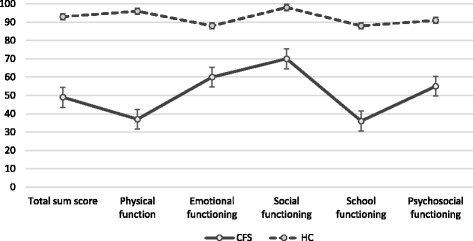Health related quality of life in adolescents with chronic fatigue syndrome: a cross-sectional study
- PMID: 26138694
- PMCID: PMC4490669
- DOI: 10.1186/s12955-015-0288-3
Health related quality of life in adolescents with chronic fatigue syndrome: a cross-sectional study
Abstract
Aim: To study health related quality of life (HRQOL) and depressive symptoms in adolescents with chronic fatigue syndrome (CFS) and to investigate in which domains their HRQOL and depressive symptoms differ from those of healthy adolescents.
Background and objective: Several symptoms such as disabling fatigue, pain and depressive symptoms affect different life domains of adolescents with CFS. Compared to adolescents with other chronic diseases, young people with CFS are reported to be severely impaired, both physiologically and mentally. Despite this, few have investigated the HRQOL in this group.
Method: This is a cross-sectional study on HRQOL including 120 adolescents with CFS and 39 healthy controls (HC), between 12 and 18 years. The Pediatric Quality of Life Inventory™, 4.0 (PedsQL) was used to assess HRQOL. The Mood and Feelings Questionnaire assessed depressive symptoms. Data were collected between March 2010 and October 2012 as part of the NorCAPITAL project (Norwegian Study of Chronic Fatigue Syndrome in Adolescents: Pathophysiology and Intervention Trial). Linear and logistic regression models were used in analysis, and all tests were two-sided.
Results: Adolescents with CFS reported significantly lower overall HRQOL compared to HCs. When controlling for gender differences, CFS patients scored 44 points lower overall HRQOL on a scale from 0-100 compared to HCs. The domains with the largest differences were interference with physical health (B = -59, 95 % CI -54 to -65) and school functioning (B = -52, 95 % CI -45 to -58). Both depressive symptoms and being a patient were independently associated with lower levels of HRQOL CONCLUSION: The difference in HRQOL between CFS patients and healthy adolescents was even larger than we expected. The large sample of adolescents with CFS in our study confirms previous findings from smaller studies, and emphasizes that CFS is a seriously disabling condition that has a strong impact on their HRQOL. Even though depressive symptoms were found in the group of patients, they could not statistically explain the poor HRQOL.
Figures
Similar articles
-
Health-related quality of life in Norwegian adolescents living with chronic fatigue syndrome.Health Qual Life Outcomes. 2020 Jun 5;18(1):170. doi: 10.1186/s12955-020-01430-z. Health Qual Life Outcomes. 2020. PMID: 32503553 Free PMC article.
-
An Italian study on health-related quality of life and fatigue in patients with chronic fatigue syndrome and patients with chronic HCV virus infection: similarities and differences.Int J Immunopathol Pharmacol. 2011 Jul-Sep;24(3):673-81. doi: 10.1177/039463201102400313. Int J Immunopathol Pharmacol. 2011. PMID: 21978699
-
Pain and pressure pain thresholds in adolescents with chronic fatigue syndrome and healthy controls: a cross-sectional study.BMJ Open. 2014 Oct 6;4(9):e005920. doi: 10.1136/bmjopen-2014-005920. BMJ Open. 2014. PMID: 25287104 Free PMC article.
-
Exercise therapy for chronic fatigue syndrome.Cochrane Database Syst Rev. 2015 Feb 10;(2):CD003200. doi: 10.1002/14651858.CD003200.pub3. Cochrane Database Syst Rev. 2015. Update in: Cochrane Database Syst Rev. 2016 Feb 07;2:CD003200. doi: 10.1002/14651858.CD003200.pub4 PMID: 25674924 Updated. Review.
-
A review of the predisposing, precipitating and perpetuating factors in Chronic Fatigue Syndrome in children and adolescents.Clin Psychol Rev. 2014 Apr;34(3):233-48. doi: 10.1016/j.cpr.2014.02.002. Epub 2014 Mar 1. Clin Psychol Rev. 2014. PMID: 24632047 Review.
Cited by
-
Presence of depression and anxiety with distinct patterns of pharmacological treatments before the diagnosis of chronic fatigue syndrome: a population-based study in Taiwan.J Transl Med. 2023 Feb 8;21(1):98. doi: 10.1186/s12967-023-03886-1. J Transl Med. 2023. PMID: 36755267 Free PMC article.
-
Pediatric Long COVID and Myalgic Encephalomyelitis/Chronic Fatigue Syndrome: Overlaps and Opportunities.Pediatr Infect Dis J. 2022 Apr 1;41(4):e139-e141. doi: 10.1097/INF.0000000000003477. Pediatr Infect Dis J. 2022. PMID: 35121715 Free PMC article. No abstract available.
-
Developing and pretesting a new patient reported outcome measure for paediatric Chronic Fatigue Syndrome/ Myalgic Encephalopathy (CFS/ME): cognitive interviews with children.J Patient Rep Outcomes. 2019 Nov 9;3(1):67. doi: 10.1186/s41687-019-0156-8. J Patient Rep Outcomes. 2019. PMID: 31707635 Free PMC article.
-
Back to the Future? Immunoglobulin Therapy for Myalgic Encephalomyelitis/Chronic Fatigue Syndrome.Healthcare (Basel). 2021 Nov 12;9(11):1546. doi: 10.3390/healthcare9111546. Healthcare (Basel). 2021. PMID: 34828592 Free PMC article. Review.
-
Adolescent's descriptions of fatigue, fluctuation and payback in chronic fatigue syndrome/myalgic encephalopathy (CFS/ME): interviews with adolescents and parents.BMJ Paediatr Open. 2018 Dec 4;2(1):e000281. doi: 10.1136/bmjpo-2018-000281. eCollection 2018. BMJ Paediatr Open. 2018. PMID: 30613800 Free PMC article.
References
-
- Royal College of Paediatrics and Child Health . Evidence based guidelines for the management of CFS/ME (chronic fatigue syndrome/myalgic encephalopathy) in children and young adults. London: Royal College of Paediatrics and Child Health 2004; 2004.
-
- National Institute of Health and Care Excelence . Chronic fatigue syndrome/myalgic encephalomyelitis (or encephalopathy): Diagnosis and management of CFS/ME in adults and children. 2007.
Publication types
MeSH terms
LinkOut - more resources
Full Text Sources
Other Literature Sources
Medical


